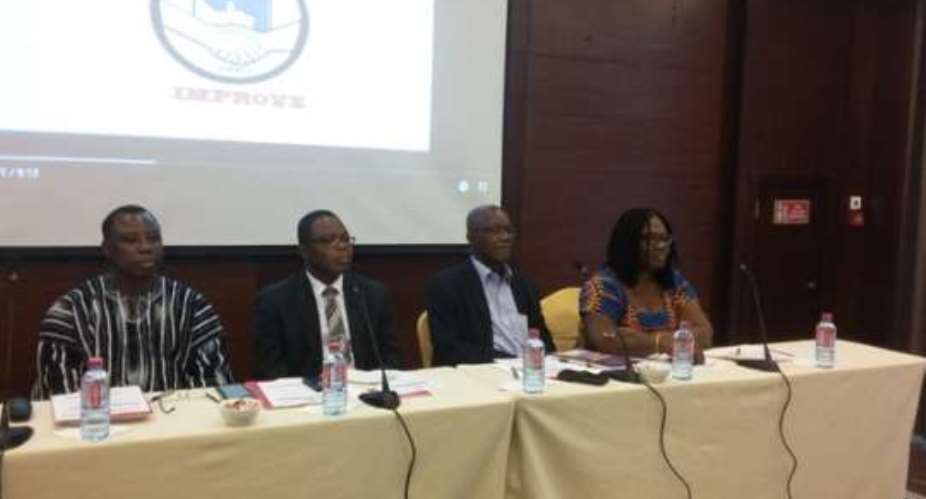By Kwamina Tandoh, GNA
Accra, Aug 26, GNA - A project dubbed: 'People for Health (P4H),' is ensuring improved access to quality health service delivery for citizens in 20 districts selected from four regions.
The P4H project seeks to strengthen organisational and institutional capacities of government and civil society organisations (CSOs) for mutual accountability in health, HIV, water, sanitation and hygiene, family planning and nutrition policy formulation and implementation.
It is a five-year project- March 2016- March 2021 being implemented by a consortium of three organisations led by SEND-Ghana, a non-governmental organisation (NGO), with Penplusbytes another NGO and the Ghana News Agency as partners, and sponsored by the United States Agency for International Development (USAID).
The target regions include Greater Accra, Eastern, Northern and Volta while the districts comprised Karaga, Central Gonja and Yendi Municipality.
Mr Siapha Kamara, Chief of Party of the P4H Project, who made a presentation on the project at an inception meeting in Accra, said the project seeks to leverage opportunities for change, building on consortium members' existing good relations with local governments, District Health Management Teams and the USAID ongoing initiatives in the health sector.
The meeting, attended by representatives from CSOs, Commission on Human Rights and Administrative Justice (CHRAJ), Ministry of Gender, Children and Social Protection, Ghana Health Service, Regional Coordinating Council, Regional Health Directorate, Ghana Aids Commission, and the Media, was to introduce stakeholders to the project and seek their support for its successful implementation to achieve the expected results.
Mr Kamara said consortium members would work to increase citizens' voices to demand for and champion improved access to quality health services.
He said: 'The consortium's emphasis on social accountability will increase CSO leadership, mobilise communities and key populations to demand quality delivery of health programmes, promote accountability in the use of health resources and simultaneously maximise the responsiveness of health service providers.'
He said the project would improve inclusiveness and equity, helping to make the country a model for a health system which served the people according to their needs.
Mr Emmanuel Essandoh, Senior HIV Advisor, USAID said in recognition of the importance of advocacy in bringing about improvements in socio-economic development in Ghana, USAID has employed a range of approaches in health, education, economic and governance sectors, to increase government accountability, responsiveness and transparency.
It also includes support for providing integrated quality services, capacity building of indigenous organisations and strengthening of health systems.
He said USAID/Ghana is committed to supporting the country in realising its goal of becoming an established middle-income country by 2022.
Dr James Clayman, a gynaecologist at LEKMA Hospital who chaired the occasion said effective monitoring in the health facilities would ensure good management for increasing efficiency and effectiveness of health services.
Mr Joseph Whittal, Deputy Commissioner, CHRAJ who was represented at the meeting reiterated CHRAJ's commitment to partner with consortium members to ensure the success of the project.
GNA





 Avoid pre-registered SIMs, buyer and seller liable for prosecution – Ursula Owus...
Avoid pre-registered SIMs, buyer and seller liable for prosecution – Ursula Owus...
 Election 2024: Mahama has nothing new to offer Ghanaians, Bawumia is the future ...
Election 2024: Mahama has nothing new to offer Ghanaians, Bawumia is the future ...
 OSP files fresh charges against ex- PPA Boss
OSP files fresh charges against ex- PPA Boss
 Withdraw unreasonable GH¢5.8m fine against former board members – ECG tells PURC
Withdraw unreasonable GH¢5.8m fine against former board members – ECG tells PURC
 Akroma mine attack: Over 20 armed robbers injure workers, steal gold at Esaase
Akroma mine attack: Over 20 armed robbers injure workers, steal gold at Esaase
 Those who understand me have embraced hope for the future — Cheddar
Those who understand me have embraced hope for the future — Cheddar
 Ghana will make maiden voyage into space should Bawumia become President — Chair...
Ghana will make maiden voyage into space should Bawumia become President — Chair...
 Train crash: Despite the sabotage, we shall not be deterred and will persevere —...
Train crash: Despite the sabotage, we shall not be deterred and will persevere —...
 Tema-Mpakadan railway project a perversion of the original viable concept design...
Tema-Mpakadan railway project a perversion of the original viable concept design...
 Train crash: Elsewhere, everyone involved in the test will either be fired or re...
Train crash: Elsewhere, everyone involved in the test will either be fired or re...
